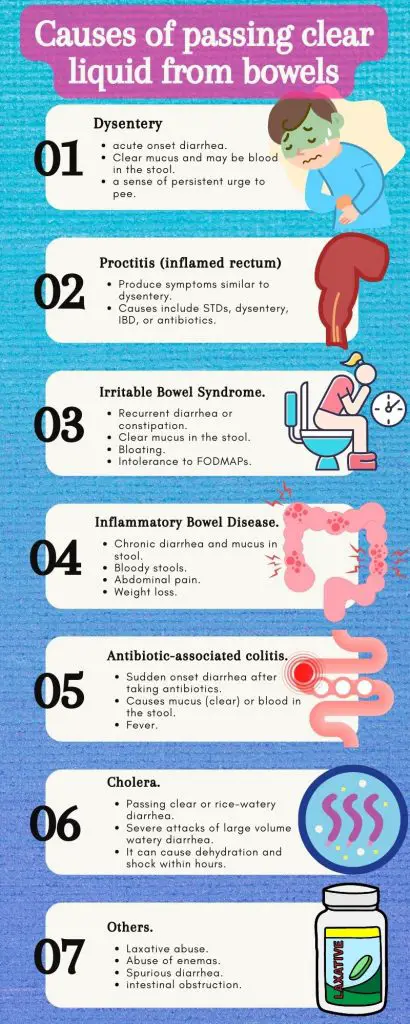Passing Clear Liquid From the Bowel: 7 causes, Gastroenterologist Explains.
Our content is not intended nor recommended as a substitute for medical advice by your doctor. Use for informational purposes only.
Passing clear liquid from stool can be due to mucus, pus, or watery diarrhea. The most frequent causes are dysentery, proctitis (inflammation of the rectum), IBD, IBD, antibiotic-associated diarrhea, and others.
The accurate diagnosis depends on many factors, such as:
- The onset of the condition.
- The duration (hours, days, or months?).
- The amount of clear liquid that passes from the bowel.
- The presence of other symptoms, such as cramps, rectal pain, and blood in the stool.
- The presence of systemic symptoms such as fever, weight loss, and anorexia.
Table of Contents

1 . Dysentery (passing clear mucus from the bowel).
Dysentery is the passage of blood and/or mucus in your stool. For example, passing clear liquid from the bowel may indicate mucus-only stool.
A mucus is usually a semi-liquid or jelly-like substance rather than a liquid.
Dysentery is a severe form of inflammation of your colon. 2 main organisms cause dysentery:
- Entamoeba Histolytica (amoebic dysentery).
- Shigella bacteria (bacillary dysentery).
Bacillary dysentery is more severe. It is more likely to cause you to pass clear liquid from the bowel.
Dysentery is an acute disease. The sudden onset of severe diarrhea with frequent bowel movements and mucus (or blood) in stool is characteristic of dysentery.
Symptoms (how to suspect dysentery):
- Acute onset, frequent bowel movement (some go to the toilet every 10 minutes).
- At first, you may experience normal diarrhea; Then, you may pass clear liquid (mucus) from the bowel.
- Sometimes, the mucus becomes mixed with blood.
- The amount of liquid poop is usually scanty.
- Usually, Tenesmus (A constant urge to poop with a sense of incomplete evacuation).
- Fever: it may become a high grade.
- Intense abdominal colics.
- A sense of mass in the rectum.
Mild dysentery is a self-limiting disease. Consult your doctor if the symptoms are severe, prolonged for more than a day, or if you have a chronic disease.
Learn More About dysentery HERE and HERE.
2 . Proctitis (inflamed rectum).
Proctitis is the inflammation of the last part of the colon (the rectum). Several diseases and conditions can cause proctitis. Dysentery (discussed before) is one of the major causes of proctitis.
When the rectum gets inflamed, it produces mucus and sometimes pus. Passage of clear liquid (mucus or pus) from the bowel can be a sign of proctitis.
Causes of Proctitis:
- Dysentery (amoebic or bacillary dysentery).
- Inflammatory bowel disease: Crohn’s disease or ulcerative colitis (discussed below).
- Sexually transmitted diseases (such as chlamydia infection, Human papillomavirus). Learn More.
- Radiation therapy for cancer.
- Antibiotics: (see antibiotic-associated colitis).
- Severe forms of food intolerance (as with celiac disease and lactose intolerance).
- Other rare causes such as rectal cancer, diversion colitis, and others. Learn More.
Symptoms of proctitis:
- A constant urge to poop, with a sense of incomplete evacuation after bowel movements (tenesmus).
- Passing clear liquid or jelly-like mucus from the bowel (can be mixed with blood).
- Sometimes, the liquid is pus rather than mucus, as with anal fistulas, rectal ulcers, and STDs.
- Lower abdominal cramps.
- Rectal pain.
- Diarrhea.
- Painful bowel movements.
- Sometimes, systemic symptoms are present (such as fever, nausea, muscle aches, and others).
Proctitis often needs evaluation by your doctor to spot the cause. Consult your doctor if your symptoms are consistent with proctitis.
3 . Irritable Bowel Syndrome.
Irritable bowel syndrome is a very frequent and underdiagnosed disease of the bowel.
The hallmark of irritable bowel syndrome is recurrent abdominal pain over prolonged periods. In addition, abdominal pain is associated with changes in bowel habits.
We don’t know for sure the exact cause of IBS. But it is a functional bowel disease (No lesions or infection, but disturbed colon function).
No specific laboratory test or imaging technique can diagnose IBS. Therefore, your doctor is the only one capable of diagnosing irritable bowel syndrome.
The diagnosis is based on characteristic patterns of symptoms. For example, IBS can cause the passage of clear liquid from the bowel.
The liquid is usually mucus. Mucus with IBS is common with Diarrhea-predominant IBS.
Symptoms suggestive of IBS (reference):
- Abdominal pain: recurrent (at least one day per week) for long periods (at least 3-6 months).
- The onset of pain is associated with a change in bowel habits (diarrhea or constipation).
- The pain is related to defecation (improves or worsens after bowel movements).
- Passage of mucus with stool (clear liquid or jelly-like substance).
- Bloating and distension.
This in-depth article explains how to suspect IBS and how doctors diagnose it.
4 . Inflammatory Bowel Disease.
Inflammatory bowel disease refers to:
- Ulcerative colitis: inflammation and ulcerative of the colon and rectum, or
- Crohn’s disease: inflammations and ulcers that can occur anywhere in your digestive tract (from the mouth to the anus).
The exact cause of IBD is still unknown. However, unlike irritable bowel syndrome, it is not a functional disease. Instead, it is an inflammatory disease with ulcers, bleeding, and mucus in stool.
Symptoms of IBD (reference):
- Persistent or recurrent diarrhea.
- Passage of clear liquid (or mucus) from the bowel. Sometimes, the mucus is mixed with blood.
- Recurrent abdominal cramps.
- Rectal bleeding or bloody stools.
- Symptoms of proctitis are present when the IBD involves the rectum and anal canal.
- Fever, anorexia, weight loss, and fatigue.
5. Antibiotic-associated colitis.
Antibiotics can kill the useful bacteria inside your colon. But, unfortunately, this can allow the growth of other harmful bacteria.
Harmful bacteria (especially clostridia’s difficile bacteria) lead to severe forms of colon inflammation.
Closterioides difficile infection (CDI) destroys the lining of your colon and causes severe colitis.
How to suspect CDI (symptoms):
- History of recent antibiotics (not necessarily for a gut-related condition).
- Sudden onset of severe diarrhea and abdominal pain.
- Soon, diarrhea becomes mucus only (passing clear liquid from the bowel).
- Bloody mucus, bloody diarrhea, or rectal bleeding may also occur.
- Sometimes. puss passes from the bowel.
- Severe abdominal pain.
- Fever.
- Nausea or vomiting.
- Dehydration.
6. Cholera (rare).
Cholera is a rare but fatal disease. Cholera is a bacteria that cause an extreme form of large-volume watery diarrhea.
The diarrhea is severe enough to cause passage of clear water or rice-watery diarrhea.
Cholera occurs in outbreaks (usually through water contamination). It is more common in crowded and low-income communities.
Cholera causes extreme dehydration and may cause death within hours if not treated.
The condition is associated with vomiting and signs of dehydration (thirst, dizziness, confusion, and peeing too little).
Consult your doctor immediately if you experience a large amount of clear liquid from the bowel.
7. Others (Less frequent causes).
- Laxative abuse.
- Other medications, such as immunosuppressive drugs, antibiotics, etc.
- Colon preparation
- Abuse of enemas.
- Spurious diarrhea (leakage of clear stool from around an impacted stool mass in the rectum).
- Intestinal obstruction.
- A connection between your urinary system (the bladder or the ureter) and the colon or intestine makes urine comes out from the bowel as a clear liquid fluid. Common conditions include colovesical fistulas, uretero-jejunal fistulas, etc.
When to see a doctor for passing clear liquid from the bowel?
- Severe diarrhea for an unexplained cause.
- Passage of clear mucus from the bum with pain and urgency.
- Severe unexplained abdominal pain.
- High-grade fever.
- A large volume of watery diarrhea.
- Vomiting.
- Passage of blood and mucus in the stool.
- Signs of dehydration include shortness of breath, extreme thirst, dizziness, etc.
FAQs About passing clear liquid from the bowel:
What causes Pooping clear liquid and gas?
Pooping clear water and gas is often due to either infection (dysentery or cholera) or chronic colonic diseases such as irritable bowel syndrome, inflammatory bowel disease, and others. Always consult your doctor if the clear watery poop persists for more than a day.
What causes pooping clear water?
- Evidence-based
- Written& reviewed by a doctor

- Last Reviewed & Updated:
- Diarrhea, Stool Changes





